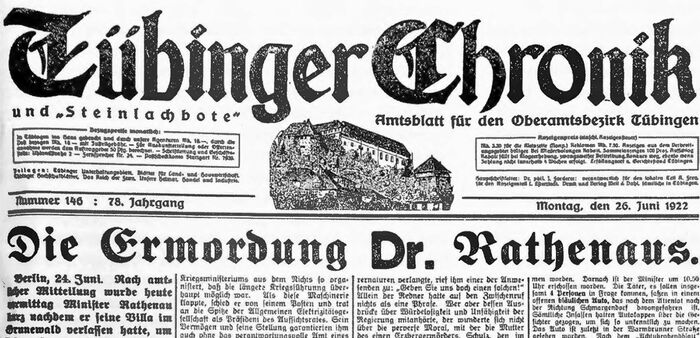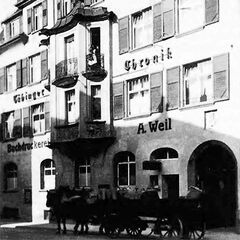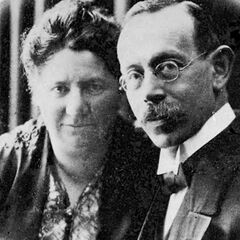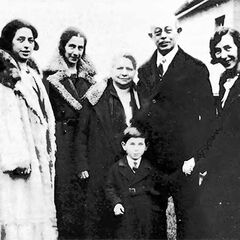Corner of Karlstraße and Uhlandstraße: Albert Weil – Cutting-Edge Publisher of the Tübinger Chronik
Station im Stadtrundgang: History Path to National Socialism
The stately building at Uhlandstraße 2 today houses the editorial department of the daily newspaper Schwäbisches Tagblatt. Its predecessor, the Tübinger Chronik, was owned by Jewish publisher Albert Weil (1862-1946) from 1903 to 1930. Under his auspices, the paper evolved into a modern and high-circulation daily.
In 1903, Albert Weil and his brother Sigmund moved from Ellwangen to Tübingen and bought the Tübinger Chronik. They invested in new typesetting and printing machines and, in 1905, built a new publishing house at Uhlandstraße 2. This is also where Albert Weil and his family of eight lived. His brother Sigmund left the publishing company in 1914. Albert Weil's goals as a publisher were to improve on the quality of journalism and to report on current political events as fast as possible.
Already in the mid-1920s, Albert Weil became the target of anti-Semitic attacks. He was molested by fraternity students; the National Socialist newspaper Tübinger Zeitung time and again vilified him. In late 1930, exhausted and in poor health, he sold his paper to Karl Höhn, a publisher from Ulm, and emigrated to Switzerland. His son Hermann Weil (1903-1973) then signed a ten-year contract as executive manager. When the National Socialists came to power in 1933, he was immediately dismissed from the paper's management because he was Jewish. He and his family found refuge in what is today Tanzania and operated a farm there.
Image 1
The Tübinger Chronik reported extensively on the murder of Jewish Foreign Secretary Walther Rathenau by rightwing radicals on June 24, 1922. Image: Tübinger Chronik / City Archives Tübingen
Image 2
The building of the Tübinger Chronik during the Albert Weil years. Photo: Geschichtswerkstatt Tübingen e.V.
Image 3
Frida and Albert Weil. In 1931, they emigrated to Switzerland and died in a retirement home in 1942 and 1946, respectively. Photo: Geschichtswerkstatt Tübingen e.V.
Image 4
Albert Weil on his 70th birthday, January 22, 1932, surrounded by his wife Frida Weil, three daughters, and one grandchild in Switzerland. The daughters and their families were, for the most part, able to emigrate; several other family members were later murdered in concentration camps. Photo: Geschichtswerkstatt Tübingen e.V.





